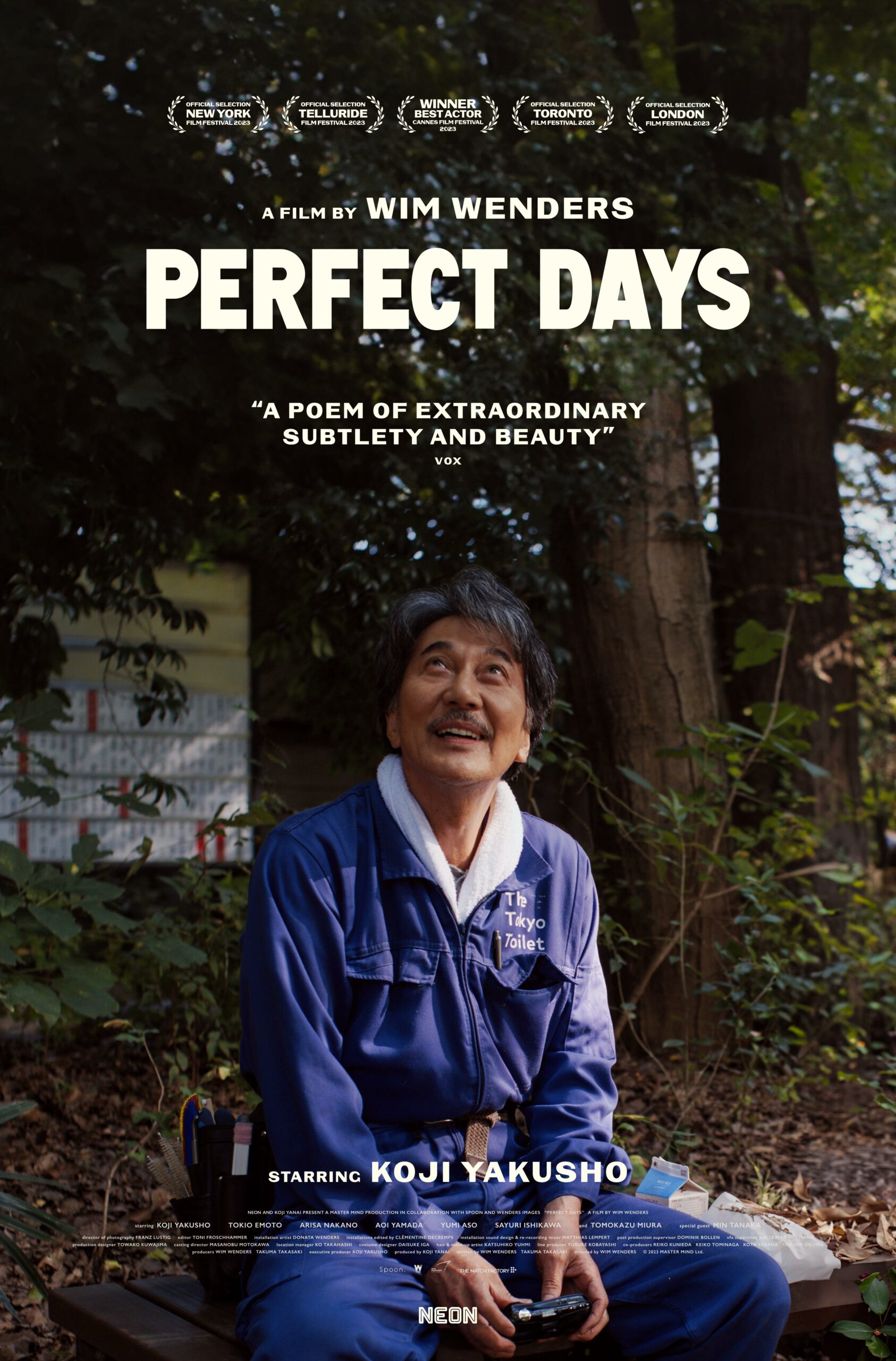Image: “Perfect Days” Movie Poster via IMDb
Everybody needs a little something to get them through their day. The music you listen to on the way to work, the book you read before you go to bed at night, the park bench you sit on during your lunch break — these are the little moments that make up Wim Wenders’ portrait of modern life, “Perfect Days” (2023). Starring Kōji Hashimoto in a Cannes Best-Actor-winning performance, “Perfect Days” follows the daily life of Hirayama, a janitor who cleans the public restrooms of Tokyo. Despite the disrespect he receives due to his job, Hirayama fills his life with routines of simple pleasures. He begins every morning by watering his plants, takes photos of the sunlight through the branches of the same tree every day on his lunch break, and falls asleep every night curled up with a good book. Hirayama is a man of few words, and the few people in his life have trouble understanding how he could be content with the simple life he leads. However, when his niece shows up at his doorstep one evening after running away from home, Hirayama finds his solitary and simple life interrupted by a connection he doesn’t expect.
Those familiar with Wenders’ previous work — iconic films such as “Paris, Texas” (1984) and “Wings of Desire” (1987) — will not walk away from this film disappointed. His introspective style is not only on full display, but is taken to a deeper level through the help of the slow cinema subgenre. The film is shot in academy ratio, which gives it an intimate feeling and helps shrink the massive cityscape of Tokyo to Hirayama’s little corner of the world. We go even further into Hirayama through dream sequences interspersed throughout the film, which are breathtakingly impressionistic and entirely in black and white, making gorgeous use of shadow and silhouette. Sunlight is a frequent visual theme as we follow Hirayama from sunup to sundown, and what Wenders does with the lighting makes you feel the warmth of the film through the screen. Sound also plays a large role in the atmosphere the film creates, making a point of showing the irreplaceable beauty of analog formats, such as cassette tapes, and how the crispness of their sound can’t be replaced through modern formats such as Spotify.
Hirayama’s love of analog also gives us insight into the film’s deeper themes, such as the alienation of modern capitalism and the loneliness that comes with aging. The film shows the struggles that come with being working class, as a younger coworker pleads with Hirayama for money to take his newest crush out dancing, and Hirayama is forced by his unseen corporate bosses to work a double-shift last minute, interrupting the joys of his daily routine. Furthermore, Hirayama struggles to connect with the people in his life, be it family, friends or romantic interests. Hirayama bonds with a friend’s dying ex-husband, his coworker’s disinterested girlfriend and his young niece, but each of them struggle to break through his quiet and reserved shell. Despite this struggle, through his cassettes and books and vintage cameras, Hirayama manages to form little ways of connecting with those he cares about. The film, however, asks if that’s enough. Is Hirayama really happy with life’s simple pleasures, or is it just his way of stomaching the horrors of a working-class life under capitalism?
Culture plays a large role in the film, both the one unique to Japan and the global culture that has emerged from the spread of capitalism. From a still-drunk businessman lingering in the toilets early in the morning to brief shots of signs in the park telling people not to leave their empty liquor bottles around children’s play areas, the specter of a national alcoholism epidemic lingers over the film but otherwise remains unconfronted. The film deals with the little things people use to get through the struggle of their daily lives, and in those moments we are reminded of how our escape from the pressures of work and bills aren’t always as whimsical as a good book or our favorite cassette tape. Existentialism breaks through the comfort of the little things as the film frequently reminds us that everything gets old and everyone dies. Buildings are demolished, people get sick, relationships end. Loneliness is portrayed as a force of nature by the film, something ever-present that we can only distract ourselves from with fleeting pleasures — none of which can satisfy our hunger for real human connection.
“Perfect Days” was nominated for Best International Feature at the 96th Academy Awards and received the Prize of the Ecumenical Jury at the 2023 Cannes Film Festival. It’s a film that perfectly captures the human condition in the modern age and what a beautiful and lonely thing life can be. My words can only do so much; it’s a film that has to be felt. If you find the time in your day this week, watch this movie. It just might change how you feel when you wake up for work the next day.
Elijah Fischer is a second-year English major. AF997636@wcupa.edu

